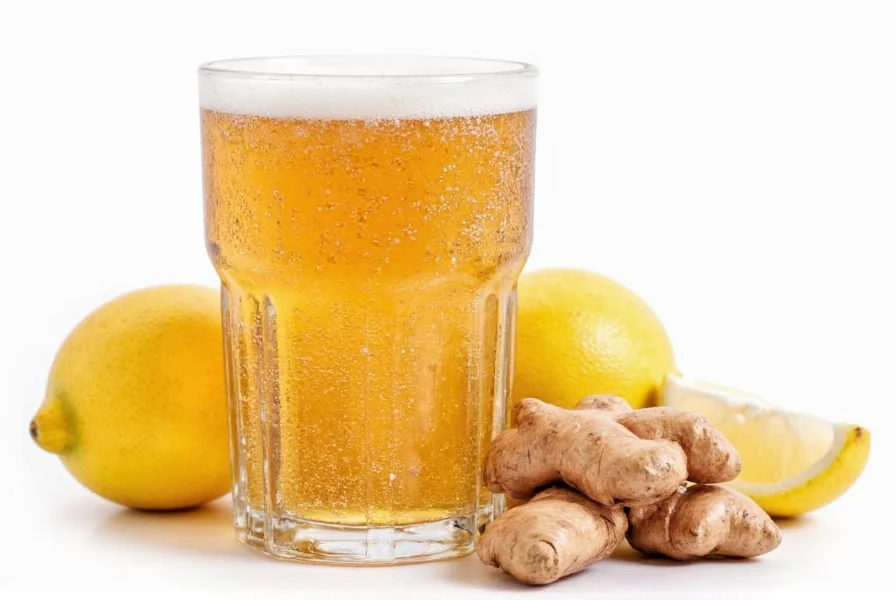Ginger ale has been a go-to remedy for upset stomachs for generations, but how does ginger ale help your stomach exactly? The answer lies primarily in ginger's bioactive compounds rather than the carbonated beverage itself. Understanding the science behind ginger's effects can help you use this traditional remedy more effectively.
The Active Ingredient: Ginger Compounds Explained
Real ginger contains potent compounds called gingerols and shogaols that have demonstrated anti-nausea and digestive benefits in numerous studies. These compounds work by:
- Blocking serotonin receptors in the gut that trigger nausea
- Accelerating gastric emptying, which helps move food through the digestive tract
- Reducing inflammation in the gastrointestinal system
- Modulating gut motility to prevent both diarrhea and constipation
Research published in the American Journal of Obstetrics and Gynecology found ginger significantly reduced nausea severity in pregnancy, while studies in Supportive Care in Cancer showed benefits for chemotherapy-induced nausea. However, these studies typically used standardized ginger extracts, not commercial ginger ale.

Ginger Ale vs. Pure Ginger: Effectiveness Comparison
Most mass-produced ginger ales contain surprisingly little actual ginger. Instead, they rely on artificial ginger flavoring and high amounts of sugar or sweeteners. This creates a significant difference between traditional ginger remedies and modern commercial products.
| Characteristic | Traditional Ginger Remedies | Commercial Ginger Ale |
|---|---|---|
| Ginger content | High (fresh or concentrated) | Very low (often <0.5%) |
| Sugar content | Minimal or none | High (20-30g per 12oz) |
| Active compounds | Significant gingerols/shogaols | Minimal active compounds |
| Research support | Strong evidence for nausea relief | Limited direct evidence |
When Ginger Ale Might Actually Help Your Stomach
Certain stomach conditions may respond better to ginger ale than others. The most research-supported applications include:
Nausea Relief Mechanisms
Ginger ale's potential benefits for nausea stem from two components:
- Ginger content: Even small amounts of real ginger may provide some anti-nausea effects through 5-HT3 receptor antagonism
- Hydration factor: The liquid content helps prevent dehydration from vomiting, which can worsen nausea
For motion sickness and morning sickness, ginger ale may provide mild relief, though studies suggest pure ginger preparations are significantly more effective. The carbonation in ginger ale might help some people with indigestion by promoting burping to release trapped gas, but this effect varies considerably between individuals.
Limitations of Ginger Ale for Stomach Issues
Several factors limit ginger ale's effectiveness as a stomach remedy:
- Sugar content: High sugar levels can actually worsen nausea for some people and may delay gastric emptying
- Carbonation concerns: Bubbles can cause bloating in people with IBS or certain digestive disorders
- Minimal ginger: Most popular brands contain insufficient ginger to provide meaningful therapeutic effects
- Artificial ingredients: Preservatives and artificial flavors may irritate sensitive stomachs
For people with diabetes or those watching sugar intake, the high carbohydrate content of traditional ginger ale presents additional concerns when using it as a stomach remedy.
Choosing Effective Ginger Remedies
If you're seeking stomach relief through ginger, consider these more effective options than standard ginger ale:
- Read labels carefully: Look for brands listing ginger root extract or real ginger in the ingredients, preferably near the top
- Consider ginger tea: Fresh ginger steeped in hot water provides higher concentrations of active compounds
- Try crystallized ginger: This contains concentrated ginger without added sugars found in beverages
- Make homemade ginger ale: Using fresh ginger, lemon, and minimal sweetener creates a more therapeutic beverage
For acute nausea, ginger supplements standardized to contain 5-10% gingerols may provide more reliable relief than commercial ginger ale. Always consult with a healthcare provider before using ginger remedies if you have underlying health conditions or take medications.
When to Seek Medical Attention
While ginger ale or other ginger preparations may help with mild stomach discomfort, certain symptoms require professional medical evaluation:
- Persistent vomiting lasting more than 24 hours
- Blood in vomit or stool
- Severe abdominal pain
- Signs of dehydration (dark urine, dizziness, reduced urination)
- Unintended weight loss accompanying stomach issues
Ginger remedies should never replace professional medical care for serious gastrointestinal conditions. They may serve as complementary approaches for mild, temporary stomach upset when used appropriately.
Practical Tips for Using Ginger Ale Effectively
If you choose to use ginger ale for stomach relief, these evidence-based strategies can maximize potential benefits:
- Let the carbonation dissipate by pouring it into a glass and letting it sit for 5-10 minutes
- Sip slowly rather than drinking large amounts at once
- Choose diet or low-sugar versions if sugar aggravates your symptoms
- Combine with other stomach-soothing practices like resting in an upright position
- Consider adding a slice of fresh ginger to commercial ginger ale to boost effectiveness
Frequently Asked Questions
Does ginger ale really help with nausea?
Ginger ale may provide mild nausea relief primarily through its ginger content, but effectiveness varies significantly by brand. Most commercial ginger ales contain minimal actual ginger and high sugar levels, which limits their therapeutic value. Research shows pure ginger preparations are substantially more effective for nausea relief than standard ginger ale.
How does ginger ale help an upset stomach?
Ginger ale may help an upset stomach through ginger's active compounds that reduce nausea and improve digestion. The liquid content also helps with hydration. However, the carbonation and sugar in many commercial ginger ales can counteract some benefits. For best results, choose ginger ales with real ginger extract and minimal added sugar, or consider alternatives like ginger tea which contain higher concentrations of therapeutic compounds.
What's the difference between ginger beer and ginger ale for stomach issues?
Ginger beer typically contains more real ginger than ginger ale, making it potentially more effective for stomach issues. Traditional ginger beer is fermented and contains higher concentrations of ginger compounds, while most modern ginger ales are simply carbonated beverages with artificial ginger flavoring. When choosing between them for stomach relief, check ingredient labels for actual ginger content rather than relying on the product name.
Can ginger ale help with acid reflux?
Ginger ale is generally not recommended for acid reflux. While ginger itself may have some benefits for digestion, the carbonation in ginger ale can increase pressure in the stomach and promote reflux. Additionally, the sugar content may trigger reflux symptoms in some people. For acid reflux, non-carbonated ginger tea is a better option if ginger is desired, but consult a healthcare provider for persistent symptoms.
How much ginger ale should I drink for an upset stomach?
If using ginger ale for stomach relief, start with 2-4 ounces and sip slowly. Let the carbonation dissipate by pouring it into a glass first. Don't exceed 8-12 ounces total, as excessive sugar and carbonation may worsen symptoms. Remember that most commercial ginger ales contain minimal therapeutic ginger, so effectiveness is limited. For better results, consider alternatives like ginger tea or supplements with standardized ginger content after consulting with a healthcare provider.











 浙公网安备
33010002000092号
浙公网安备
33010002000092号 浙B2-20120091-4
浙B2-20120091-4